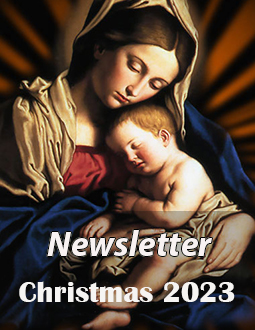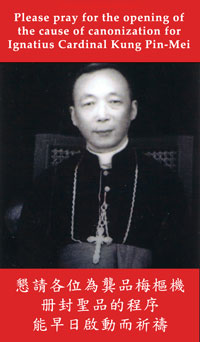Guidelines on China from the Vatican
by Eugene M. Nugent
July 3, 2004
![]()
(These Guidelines have been revoked by Pope Benedict the XVI's Letter to the Chinese Church signed on May 27, 2007 and released on June 30, 2007)
![]()
To: All Legitimately Appointed Bishops of the Catholic Dioceses in China
Subject: Several Basic Problems Concerning Reconciliation and Communion inside the Church.
Respectful bishops and priests:
May the peace of Christ be with you all!
At the present moment, the Church in China is in a critical period of difficulty and persecution. Many bishops and priests are still imprisoned and have not been released. Every aspect of the life of the Church in China is under the government's widespread and systematic control. In this situation, I encourage that we all firmly maintain the principle of faith and full communion. This is very important in order to belong to the One, Holy, Catholic and Apostolic Church.
As you already know, the Holy Father explicitly asked us to seek unity and reconciliation in the Church in China; but, this must be carried out in the principle of truth, clearly stating the principle of reconciliation, but rejecting the so-called "three autonomies" principle. At the same time, this must be carried out with charity in order to promote friendly relationships and mutual trust. The Holy Father or the Holy See will never force the loyal/underground Church community to make concessions on the question of principles.
Like Catholics everywhere, the Catholics in China should be honest and good citizens. They love their country, but should not be forced to make compromises on their faith or be forced to join an organization which usurps the authority of the Holy Father and the lawful authority of the bishops. All the bishops in China should now unite together, clearly and firmly demanding the total freedom to minister to the Church without any government interference.
Obviously, the Patriotic Association has the characteristic of being in schism. It is the source of confusion and divisiveness. The Patriotic Association claims that it can assume the role that belongs only to the bishops in order to minister to the Church under the principle of maintaining the faith. But, in past years, the Patriotic Association unceasingly placed heavy pressure on bishops and priests to a degree that has become unbearable. Bishops and priests can never accept the principles underlying the Patriotic Association.
In recent months, I have received many letters from bishops and apostolic administrators, asking for a directive on such questions concerning "communicatio in sacris," reconciliation with priests of the Patriotic Association, and the acceptance of Patriotic Association priests by the loyal and lawful bishops. Accordingly, I wish to state the following points to you, the contents of which have already been communicated to several bishops.
- The "8-point" directive1 issued in March 19882 and approved by the Holy Father is still in effect.
- All legitimate priests and deacons should obey the "8-point" directive1, and will therefore not have "communicatio in sacris" either with illegitimate bishops and religious or with those religious under the Patriotic Association. (Please refer to the 5th point in the "8-point" directive1).
- Even in situations in which concelebration has been permitted, a priest may still have the freedom to choose whether or not to concelebrate. He should not be forced to concelebrate if he is not willing. (Canon 902)
- A bishop ordaining a priest or deacon from another diocese without a dimissorial letter from the proper ordinary is ipso facto suspended. (Canon 1383) He does not belong to that diocese. The bishop who ordains him is responsible for him.
- In order to avoid further divisiveness, Patriotic Association priests and deacons can be reconciled only after the entire body of clergy reaches a consensus establishing unequivocal terms and conditions for the acceptance of the Patriotic Association clergy and religious.
- Priests and deacons requesting to be accepted by the loyal and legitimate bishops and to join their dioceses must pass a period of discernment, and fulfill the terms as stipulated in the paragraph 8, sections A, B, C, G, and H of this document before they can be accepted and supported.
- Extreme care must be taken to explain the situations as described in paragraphs 5 and 6 above to the faithful in order to avoid potential confusion and divisiveness.
- For the sake of prudence, when reconciling with the Patriotic Association's priests and deacons, or when accepting into the diocese these priests and deacons who were ordained without a dimissorial letter from their proper ordinary, the following procedures must be observed.
- The bishop must seek the opinion of and obtain agreement from the priests' council.
- Those priests and deacons of the Patriotic Association seeking acceptance must be recognized by the loyal and legitimate priests as fervent priests or deacons in good standing. They ought to be those respected by the faithful.
- Before the acceptance, he must profess his obedience and respect to the legitimate bishop in front of two or more loyal priests. He must read the "professio fidei," and promise never to speak or do anything damaging the reconciliation. He must also clearly declare that he opposes the Patriotic Association and its "three autonomies" principles.
- He must publicly reject the principles of the Patriotic Association.
- He must publicly declare that he no longer belongs to the Patriotic Association.
- He must declare that he will not have any further relationship with the Patriotic Association in the future, nor he will support it.
- He must declare that he obeys the "8-point" directive1, and that he will not have any "communicatio in sacris" with any illegal bishops or religious belonging to the Patriotic Association. (Please refer to the 5th point of the "8-point" directive1)
- Finally, he must sign a document to prove his position. The original statement must be kept in the diocesan files while a duplicate is to be sent to the representative of the Holy Father.
- In order to maintain communion among the priests, when a lawful bishop wishes to ordain a seminarian trained in a Patriotic Association seminary, besides passing a period of discernment, he must abide by the terms stipulated in paragraph 8, sections A, B, C, G and H of this document.
- I hope that the above 9 points may be helpful to facilitate mutual cooperation between bishops and religious, thereby promoting increased harmony and reconciliation in your community and the whole church in China.
May our Lord, the Eternal Priest, bless your episcopate!
May our Lady of China be with each one of you!
Yours sincerely in Christ
Eugene M. Nugent
July 3, 2004

Translation edited by Cardinal Kung Foundation October 4, 2004
1 Throughout this document the author refers to the "8 point directive," but his comments actually refer to the source document, the 8-Point Guideline.
2 The author references March 1988 as the date of the release of the Guideline, but the actual release date was September 3, 1988.




